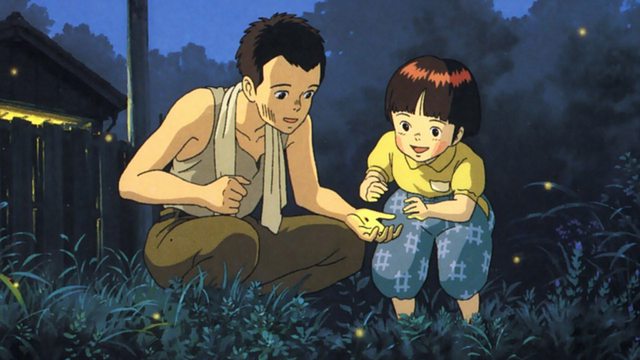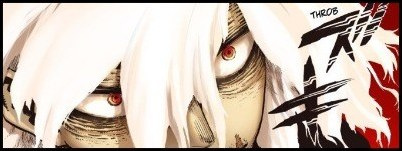Outside of Spirited Away, Grave of the Fireflies is the most important anime movie that I had yet to watch, and with how well-known and lauded it is, I was pretty worried going on because I already know the broad strokes. I know this is a war story centered around two siblings who both end up perishing by the movie's end, and I thought this would rob the movie of it's emotional power.
So to my surprise, we're immediately told at the beginning of the film that Seita and Setsuko end up dying, that knowledge being the actually intended experience meant that I did essentially get to experience this movie through fresh eyes with no spoilers to detract from. I like that decision beyond saving me from spoilers, because I think the framing of Seita (& Setsuko) reflecting on these experiences all throughout the film lead to some of the stronger moments, like Seita's reaction at Setsuko's crying about trading their mother's kimono's for rice. If anything, I wish their ghosts were a more prominent through-line throughout the film, it's already a movie that acts you to reflect through constant pillow shots, I would've preferred more additional scenes showcasing the reactions of Seita in re-visiting these memories as I feel that would've endeared me towards his character more. Not that I think it should've been a constant, but maybe just one or two more segments in there.
And getting these moments might've been beneficial to me because to be completely honest, I didn't cry during this film. I didn't even come close. It's official, I'm dead inside. In terms of emotional reaction, the most it got out of me was a tinge of anger at Seita's pride, and how much of an active role he played in his sister's death. Even while watching the film I recognized it's not entirely fair but to see a clear solution so ignored despite the desperate circumstances of his sister's health, I think it's natural to get a bit frustrated. But like, he's also a 14 year old and raised in the culture that likely values pride and honor more than any other attribute, at least for the men. And considering his father works in the Navy, and his mother at the beginning of the movie trusted him enough to finish up at the house and bring his sister to the safe house, those ideals were definitely imposed on him.
Despite always hearing this in the context of a war film, or anti-war film to be specific, it kinda felt more like a parable about the folly of pride, maybe even the rebellious nature of youths trying to live outside the system which from my limited knowledge was something Japan was experience an up rise in with biker gangs around the time (I think this movement inspired parts of Akira too), and it felt like the war message where are backdrop. I've read people interpret Seita's prideful actions as a further metaphor for Japan's own prideful actions in the war, like how they didn't even surrender after the first atomic bomb was dropped. I like that take quite a bit, since it ties the war setting and the personal story up really nicely, though it's certainly not something that came to my mind while watching it.
Parable aside I do think the war stuff was handled well and while I do view it more about pride, war is an intrinsic part of the experience. I like how distant it becomes so-to-speak, since a big motivator for Seita throughout the film is not only keep Setsuko happy, but to shield her from the horrors of what is going on, with the dead body at the beach or not telling her their mother died. I think one of the most interesting parts of the film is that Seita doesn't cry when his mother died (and I think the sight of his mother was the hardest part of the film for me), he only cries when he finds out that Setsuko was told about their mother's death. I wonder if that is because he felt he failed to protect her there, or if it allowed him to fully confront the reality, or a combination of both. Him do the swings on the handle bar after telling Setsuko she can't visit their mother yet in an attempt to make her feel better even though she doesn't seem to pay him any mind stood out to me. I can't help but fail that Seita's method of dealing with the death was to attempt to provide for Setsuko in a sense. What motivates him to have them move out isn't any of the Aunt's remarks, it's Setsuko saying she hated living there.
Speaking of the Aunt, if Seita doesn't get the hate, she does. I also don't think that's entirely fair, though similarly with Seita I understand the reaction. I did think it was callous to insult Setsuko for crying, especially given later information that it was likely brought on by the Aunt telling her the truth about their mother, and she probably holds more culpability as an adult but I also understand the limited rations they had and why'd she be upset with Seita especially spending all his time having fun with his sister instead of helping out. I have no doubt that had they returned to the Aunt, they wouldn't have died, and I beliAnd that reminds me, there's a lot of talk about the apathetic nature of society towards them being a big problem, and while I agree that is within the narrative to an extent, but I don't agree with that assertion fully. One of the very first acts we see in the film is somebody leaving a rice ball by Seita, the police officer takes Seita's side when he's turned in for stealing crops, and the farmer does offer genuine advice to the kids when he can no longer give them any of his resources. Nobody goes above and beyond in an attempt to help them admittedly, but there's several acts of kindness to them, what leads to their death is undoubtedly the decision to isolate from society and handle things on the two of them.
I'm left not really knowing how to rate this anime. It's clear that it gave me a good amount to think about and I think it's a well-made movie, but I didn't really enjoy watching it and not for the reasons of it being too sad, but because it didn't emotionally connect with me on any level beyond mild madness. The montage of happy Setsuko after her death if anything even came across as pretty cheap, I don't feel the movie needed to highlight the sadness of her lost life in that method. It actually further divorced me from the emotion of the story, cause it felt like a blatant attempt at emotional manipulation. And it's a shame because I think the surrounding scenes are all well-executed, the "She never woke up" line especially. Albeit, those scenes didn't really engage me on an emotional level either, but they felt genuine whereas the montage did not.
So the movie failed to engage me in a meaningful emotional capacity and as a result, I didn't really end up caring about the movie even though I recognize there's a lot of good, interesting stuff to muse about within it. I'm going to personally go with a 6/10. |




